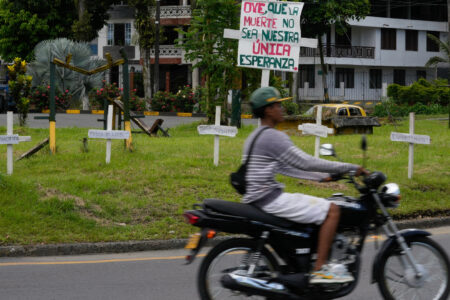
(This article has been translated into French.)
Can a little-known practice called “outcomes purchasing” generate solutions to social, economic and environmental challenges? We believe the answer is yes. Through a form of outcomes purchasing we call community-driven outcomes contracts (C-DOCs), governments, communities, investors and the charitable sector can collaborate in transforming seemingly intractable problems into opportunities for inclusive growth. Moreover, the soon-to-be-launched $755-million federal Social Finance Fund presents Canada’s social sector with a powerful new tool for financing such work.
First, let’s consider the status quo. Governments provide grants and contracts to social-purpose organizations (social enterprises, nonprofits and charities) to deliver programs that are closely tracked on the basis of activities or outputs: how many homeless people sheltered, how many people enrolled in addictions treatment programs and so on. However, short-term fixes that alleviate suffering do little to address the conditions that create such problems. At worst, they foster dependency.
In contrast, C-DOCs set targets that social-purpose organizations are then funded to deliver. They provide an incentive to innovate: to iteratively test, evaluate, adapt and scale evidence-based approaches. Whether the issue is homelessness, chronic disease or greenhouse gas emissions, providing financing in a way that rewards results can accelerate systemic shifts.
C-DOCs are similar to social impact bonds (SIBs), in that investors provide upfront capital to a social-purpose organization to implement a new approach to a problem. If successful, an outcomes purchaser — usually a government — pays back the investors. However, C-DOCs have several important differences from SIBs. First, community priorities inform and drive the projects, and thus accountability is not just to investors and outcomes buyers but also to community stakeholders. Second, C-DOCs might include, and indeed require, a community engagement and development phase supported by grants, as well as the seconding of technical expertise to social-purpose coalitions.
Let’s look at two examples in which our organizations are involved.
Jobs + renewable energy = economic reconciliation
Winnipeg-based Aki Energy is an Indigenous-led social enterprise founded in 2013 to build relationships with First Nations and train community members to do geothermal installations. Aki replaces expensive, noisy and polluting diesel generators in First Nations communities with geothermal systems that meet community heating and air-conditioning needs, lower utility bills, reduce GHG emissions and create good jobs in the process. Aki has installed systems in over 400 homes and community buildings in the northern Manitoba communities of Peguis, Fisher River, Sagkeeng and Long Plain First Nations. Originally, it worked with Manitoba Hydro’s Pay-As-You-Save program, receiving $20,000 in upfront capital investment for each installation, recouped through a long-term charge on utility bills — thus benefiting communities, taxpayers and the environment.
However, in 2016, Aki Energy hit a roadblock. Federal bureaucrats weren’t convinced that Pay-As-You-Save was the right program for the delivery of large-scale energy transformation on reserves, and they halted their involvement. After unsuccessful efforts to challenge this ruling, Aki co-founder Shaun Loney and Ian Bird, president of Community Foundations of Canada (CFC), worked with the McConnell Foundation and Raven Indigenous Capital Partners to develop the community-driven outcomes contract that now helps finance Aki’s operations.
By definition, a C-DOC must meet needs that have been prioritized by communities. In this instance, those needs are skills training and job creation, lower utility costs, reduced dependency on social assistance — and the completion of geothermal installations. Raven Capital is an Indigenous social finance intermediary focused on revitalizing Indigenous economies. Several foundations and the communities themselves are providing upfront investment, and CFC is the initial outcomes buyer, with additional purchasers set to come onstream via a larger outcomes fund.
Healthy food + social enterprise = reduced incidence of diabetes
Food insecurity is an acute problem for many Indigenous people in Canada’s North. By several measures, Nutrition North Canada — the freight subsidy program intended to reduce the cost of food in northern communities — is not working. One result is runaway rates of type 2 diabetes, afflicting 17 percent of on-reserve First Nations individuals versus just 5 percent of the general population. An Ontario study showed that caring for one person with diabetes entails $10,000 in extra health spending annually without considering expenses like air transport and medical support, which are higher in remote communities.
In the Manitoba community of Garden Hill (population 2,600), diabetes treatments cost $2.6 million annually and the Nutrition North subsidy is nearly $1 million. To qualify, food must be flown in from the south — locally raised food gets no support. It’s a system designed for poor outcomes: expensive and (often) unhealthy food, erosion of the local food economy, escalating rates of diabetes and burgeoning health care costs. Outcomes purchasing is designed to tackle this sort of wicked problem.
Part of the solution is to revive the local food economy. With support from a consortium of foundations and provincial agencies, Aki Energy’s sister enterprise, Aki Foods, worked with elders and other leaders to create the Meechim Project. Employing local residents, it has established a farm with a poultry operation, an orchard and an irrigated vegetable garden. It sells healthy food at prices lower than those at the freight-subsidized monopoly retailer.
Raven Capital is working with First Nations communities, foundations, governments and private sector participants from Manitoba and PEI to design C-DOCs that will finance improved health and employment outcomes in Garden Hill and similar locations.
Governance for outcomes
The federal government’s new $755-million Social Finance Fund gives Canada a powerful tool with which to co-invest public capital in systemic social innovation. We believe C-DOCs can deepen the fund’s reach and impact. With additional capacity building and R&D support, communities and a diverse range of social-purpose coalitions will soon have access to repayable capital to address a wide range of challenges.
Governments are key outcomes buyers and can send important signals to markets, including through the use of C-DOCs. But when it comes to collective challenges like mitigating and adapting to climate change or advancing economic reconciliation with Indigenous peoples, governments cannot act alone. Corporations have important roles, too — through social procurement and investment in outcomes-focused social enterprises. Trustees of foundations, university and hospital endowments, public pension funds and Indigenous trusts must accept that in our current circumstances, the exercise of fiduciary duty entails more than maximizing financial returns. It means investing in sustainability, equity and social cohesion, and resilience. This in turn requires improved facility with behavioural economics, evidence-based policy-making and smart metrics.
C-DOCs cannot solve problems by themselves, but in the hands of leaders in all sectors — public, private and community — they can help to accelerate societal transition at multiple scales at this critical time.
Photo: Near Garden Hill First Nation, Manitoba. Shutterstock / by Marielle Landor
Do you have something to say about the article you just read? Be part of the Policy Options discussion, and send in your own submission. Here is a link on how to do it. | Souhaitez-vous réagir à cet article ? Joignez-vous aux débats d’Options politiques et soumettez-nous votre texte en suivant ces directives.






